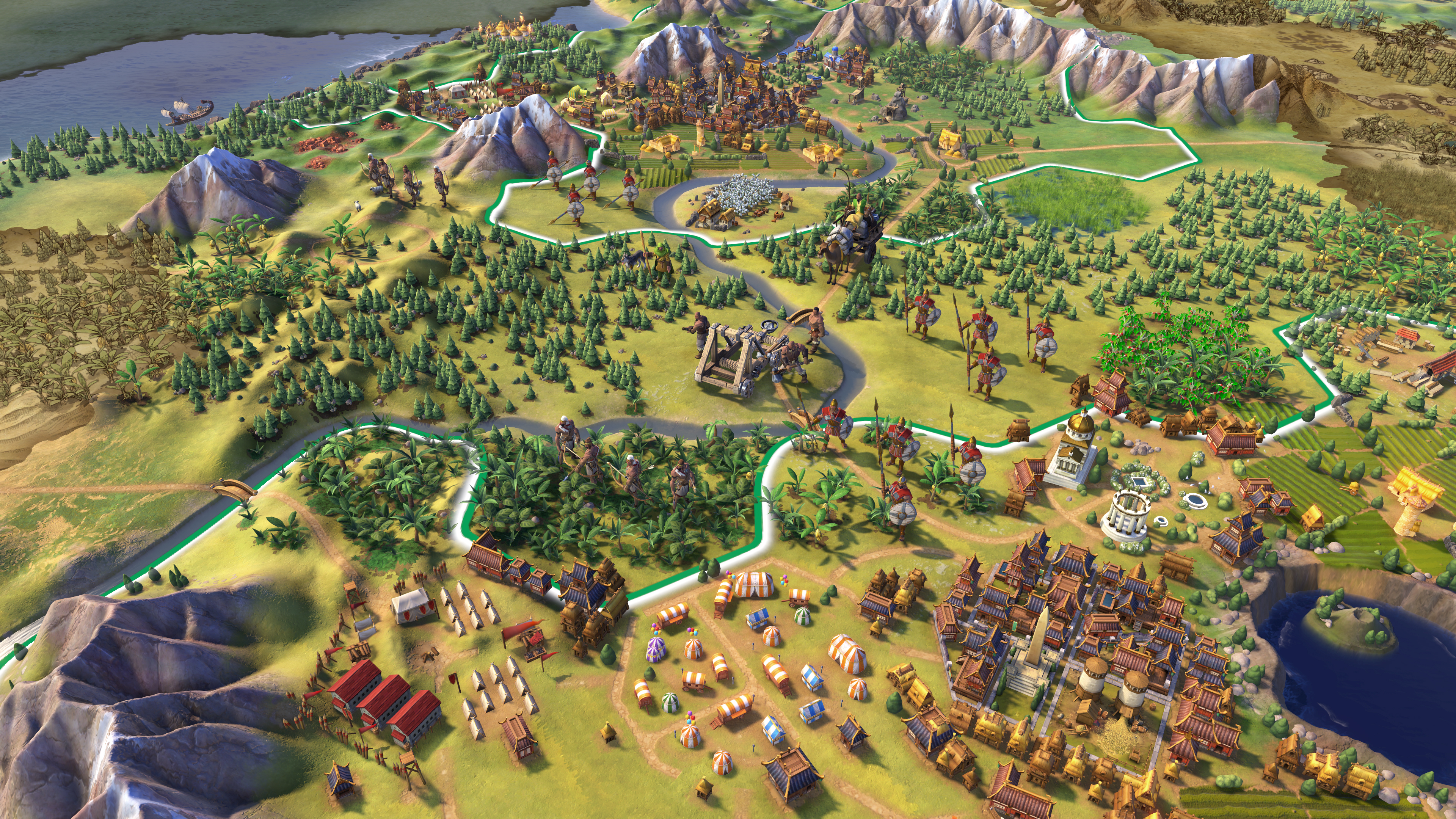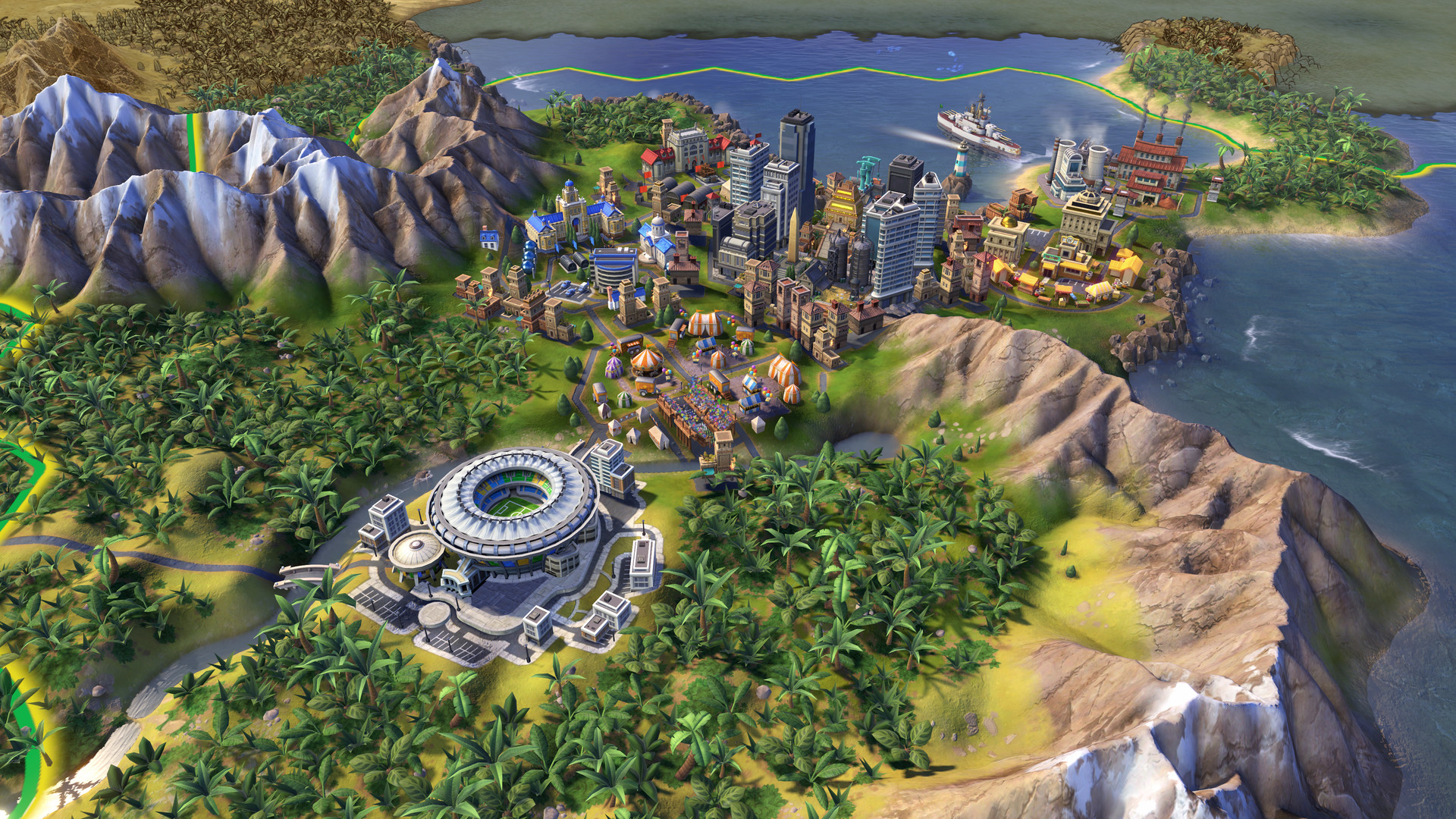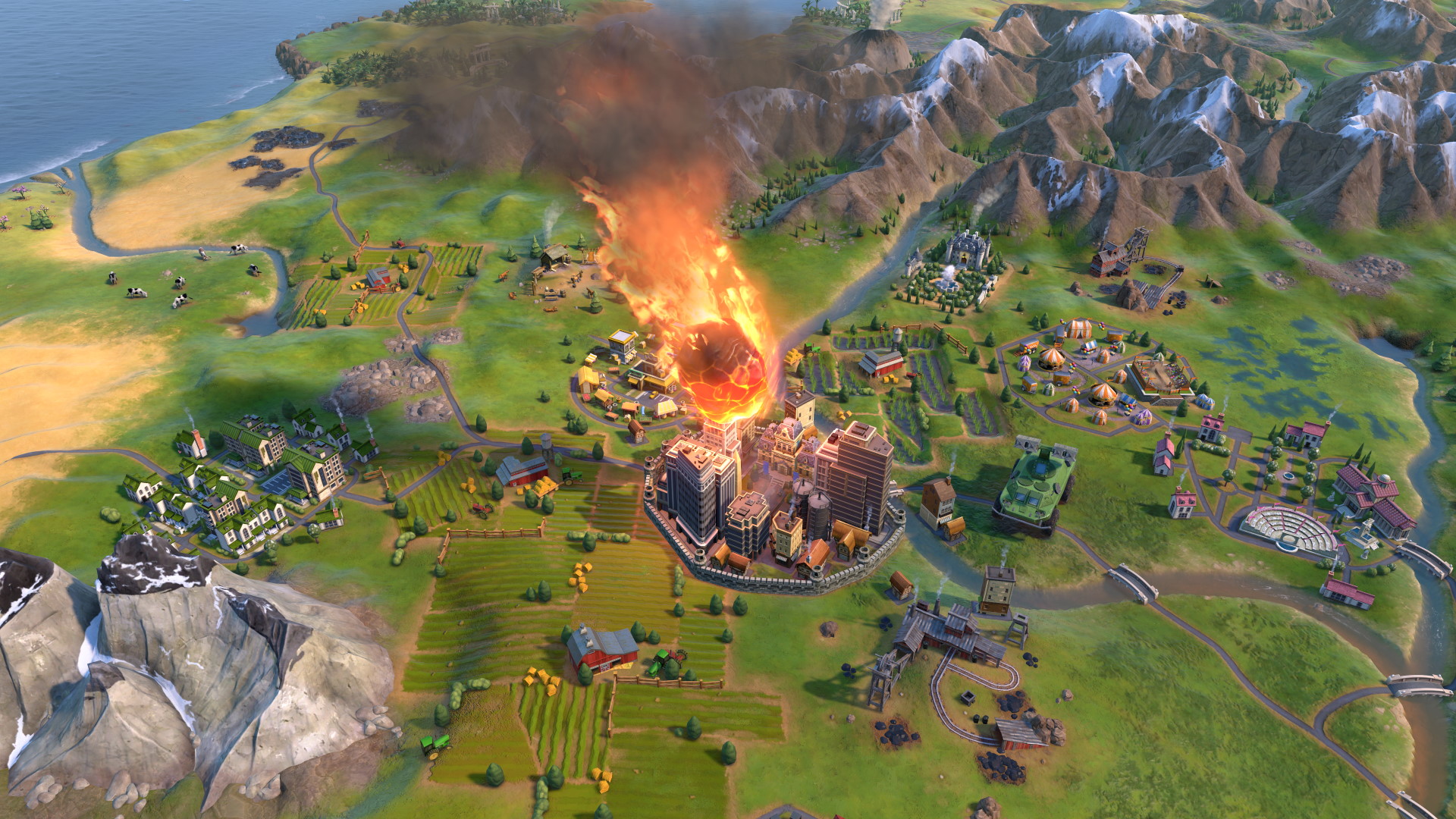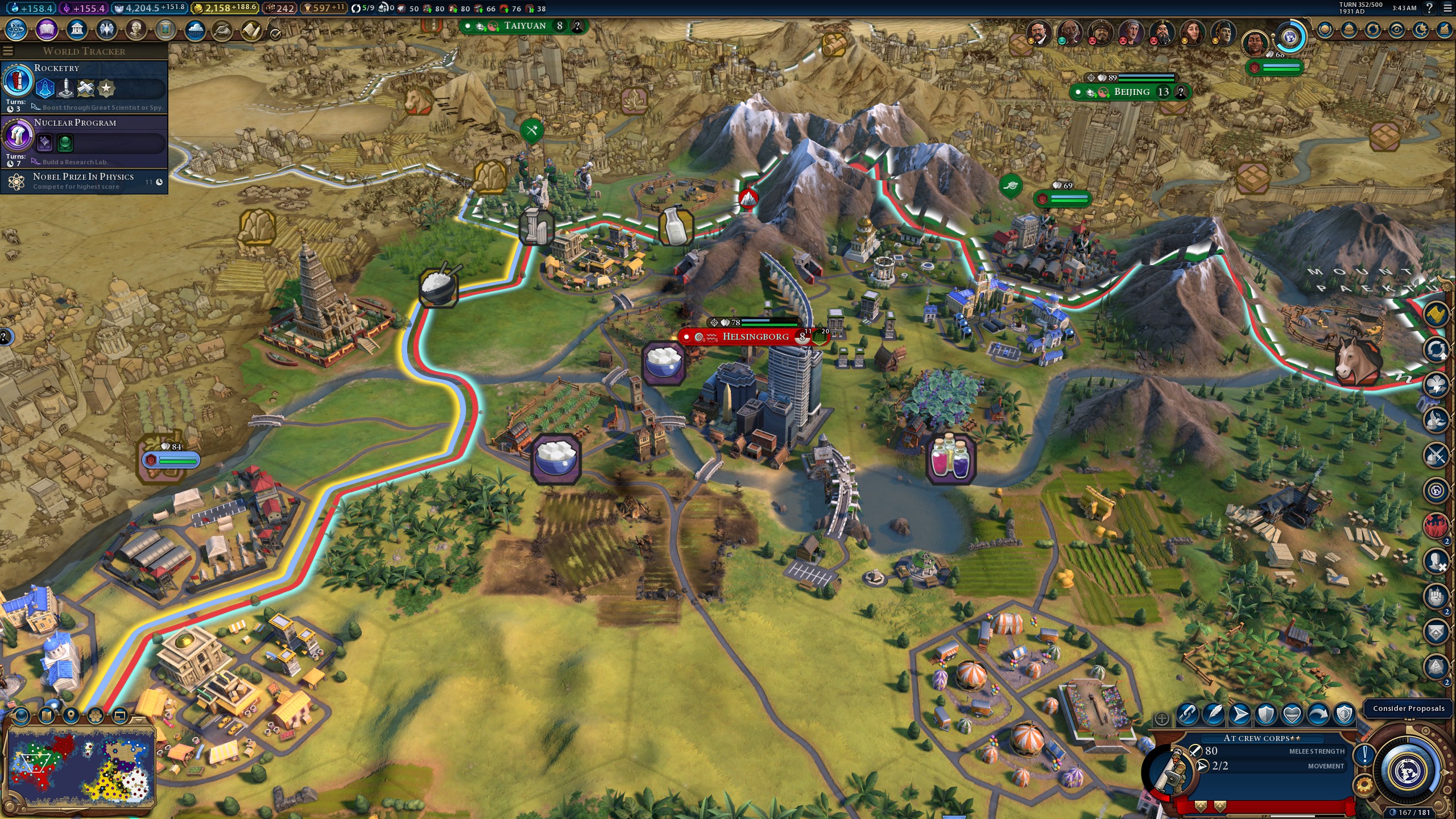How Civilization 7 could reinvigorate the ancient series | PC Gamer - jacksonexected
How Civilization 7 could reinvigorate the past serial publication

As the final stage major update for Civilization 6's New Frontiers season lands this week, I'm reminded of the fact that it's the Civ game I've played the to the lowest degree, past far, since I fell infatuated with the serial publication through with Civ 3 a round 20 years ago. And I'm not alone in feeling a little bit let down away it. It seems alike Civilisation has stagnated in a genre that keeps evolving and thriving in the manpower of series like Europa Universalis and Sum up War. And with Bountifulness's Humankind on the apparent horizon, a possible Civilization 7 has a full-grown, direct competitor right in its backyard.
I may be making the situation strong gloomier than it likely is. Civ 6's DLC has been well received, and the series maintains a elephantine, dedicated fanbase. Firaxis could probably keep doing what it's doing and skate on for another decade operating theatre Thomas More. But American Samoa our standards for liberal arts strategy games interchange, and recently devs and players come onto the scene to commingle things up, I think this would be a major missed chance. So present's how Firaxis can keep Civ relevant.
Let me set my own goals
Civ 5 and 6 represent a departure from their forebears by evoking neatly-packaged board games focused on bespoken win conditions that everyone is racing toward. This might glucinium good for competitive players, but information technology takes whatever of the feeling of "roleplaying chronicle" out of the series. It no longer feels like I cause the freedom to chassis whatsoever kind of society I want. Everything from the dawn of my civilization to the very end is in pursuit of launching a rocket, or conquest the creation, or qualification everyone buy my blue jeans. The accent on the destination distracts from the journey.

This is a big part of wherefore I finally drifted out from Civ and toward games like Reformer Kings. I like to set my own goals. I like to decide what I think a palmy civilization looks like, sooner than pick from a listing of possibilities the developers provided. I comparable to be able to change my mind about the kind of bon ton I'm building if it makes sense at a predictable point. I don't like the idea that placing a district in the wrong tile in the classical era might lead to me organism awfully behind in skill or religious belief more eras later.
A victory-focused approach means the designs for each civilization's unique abilities become overly-complicated, too, since they are hard sol hard not to pigeon-hole each one into a specific playstyle. If it takes more words than this entire paragraph to explicate what a hockey rink does, you've gone a little too far. I'd preferably see Civ 7 adopt a ism similar to Stellaris, where there Crataegus oxycantha be a set of specified victory conditions to shoot for for, but the entire see isn't designed around them.
Stop modelling everything connected new Western society
Regardless of whether you're playing as the English, the Maori, or the Cree, every society in Civ 6 seems to land up in roughly the same place. And that is something on the lines of the Unsegmented States in the 21st Century—a centralized, urbanized nation put forward with skyscrapers, heavy industry, and an imperialist, exceptionalist outlook along the rest of the world. That's non only restricting the diverseness of playstyles the series could introduce, but it's bad account as well. In 2018, when the Cree were added to Civ 6 in the Rising slope and Fall elaboration, the headman of the Poundmaker Cree Nation, along whom the faction was based, same Eastern Samoa much.

"It perpetuates this myth that First Nations had similar values that the colonial acculturation has, and that is one of conquering else peoples and accessing their terra firma," Headman Milton Tootoosis said. "That is totally not in concert with our conventional slipway and Weltanschauung."
I'd love to see a Civ game that acknowledges this, and allows me to build a non-imperialist society that takes good handle of its land and its citizenry, values sustainability over sublimate productivity, and preserves its sovereignty against imperialistic powers. Maybe I don't even need to chassis factories. The indigenous nations in what are now the Pacific Northwestern United States knew how to cultivate salmon runs that produced more high-quality protein per centare—with far less travail, contamination, and ecological hoo-hah!—than the best farming techniques of the Continent settlers that displaced them.
Why can't I build a society that looks like that? Wherefore does "progress" always have to calculate like touchable flat blocks and 5000 TV channels full of corporate advertising and row after row of smog-belch refineries? It speaks to a troubling worldview if we say that unity way is universally meliorate, or more "advanced" than the other.

When you treat the modern, developed West equally the reasonable terminus for any successful beau monde, you Doctor of Osteopathy a disservice to the victims of colonialism. It was and is through their troubled that the obscene concentrations of riches we see in those societies came almost and continue to perpetuate themselves. In a very meaningful way, you're only letting us play as the "bad guys'' of history. You either drop dead in obscurity or live long enough to see yourself become the rapacious empire. This framework also sweeps under the carpet the massive ravaging to the biosphere that has do as a solvent of these modes of civilization. Which brings us to...
Hurt Pine Tree State more, history daddy
Both of the major expansions for Civilization 6, in concept, are almost exactly what I would feature proved to make if you'd asked me to design them myself. In practice, they both declension short. Gathering Storm's advanced game global climate change, even if you allow it run unrestrained, is so minimally disruptive that it can almost be ignored. City centers, even suited happening coastal Lowlands of Scotland, are immune to any kind of permanent destruction because Firaxis was worried close to making the consequences too harsh. Similar logic kept IT from reintroducing the possibility of nuclear holocaust that previously existed if you dropped too many bombs in older Civ games.
For extraordinary thing, this majorly downplays the role global climate change bequeath play in the coming hundred. And it simply makes the unfit less interesting! I'll admit I'm a bit of a masochist, merely I find most strategy games are far-off more engaging and memorable when I'm thoroughly screwed and having to fight tooth and collar to hold ou.

There are some game settings in Gathering Storm that allow you amp up the punishment of ecological disasters, but I still don't think information technology goes far enough. There's nary refugee crisis. I'm never forced into endgame resourcefulness wars or suave tension aside the trespassing overseas and mood-related famines. I can nuke the shit out of every roofing tile outside my borders and never have to worry every bit long as I didn't move my units through the green stuff. Things simply spirit likewise much like business as usual.
Rise and Fall is more than the same. History can often be framed in price of full arcs showing ontogeny and collapse, prosperity and ruin. And while the Caliginous Historic period mechanic pays lip service to this, it rarely gives me the horse sense that my whole civilization is declining. It's a few weeks of furious weather, non a desperate last stand or the final onset of simmering decay.
I want the dramatic curve of my people in Civ 7 to feel more impactful, with downturns that are final and unavoidable. Triumph tastes so so much sweeter if the road to it's fraught with devastation and sorrow. Just ask the Starks. Maybe my nation collapses raw, and I have to pick a new culture to take over with from where they left away? Human race is already doing something similar, and I think Amplitude is on the right track.
Give me a sense of office again
I've come to hate Civ 6's district system. It creates recent game maps that don't look at all realistic compared to past Civ games. While the naked maps themselves are quite captivating and memorable, once your empire is splayed out crosswise them you remnant improving with these ugly, fake-looking strips of trucking rig-connected, technicolor conurbation. A city-sized, bright red military base here, a colossal, loud mart there... I don't feel transported to history; I feel like I'm looking for at a very elaborate panel game.

Civ 5, in contrast, features tidy cityfied centers encircled by attractive farms, mines, and past outlying industries that made for a precise organic seem from the old clear adequate to the information historic period. The concept of districts itself isn't bad, but I want to be able to look at my civ and feel like I could write a travel guide about it.
I want to be able-bodied to view the logic in where major population centers sprang dormy, how suburbs sprawled exterior from them, where the fertile agriculture regions are, and where the hills are dotted by small logging towns. I want it to look less "game-y" and more than like an atlas. The fantasy of building a fictional society is more pivotal than making it very clear what each of my color-coded civic LEGOs does.
Country roads...
In a lot of ways, I feel for like I've moved on from the Civilization series. The kinds of stories I used to tell myself in my head while playing are now expedited much better by games that take a less abstract approach to history. But it doesn't need to check that way. If Firaxis is willing to take some chances and deal how historical strategy has evolved by leaps and bounds since its last couple cracks at the genre, information technology could make something truly undreamed of that proves why it held the crown for so long.
Be daring where you could be dependable. Disrupt where you could have chosen to merely iterate. Sid Meier himself said of scheming Civ 1 with Bruce Shelley in 1991: "We were young, and we had atomic number 102 fear." The world is still yours for the taking. And fortune favors the bold.
Source: https://www.pcgamer.com/how-civilization-7-could-reinvigorate-the-series/
Posted by: jacksonexected.blogspot.com


0 Response to "How Civilization 7 could reinvigorate the ancient series | PC Gamer - jacksonexected"
Post a Comment